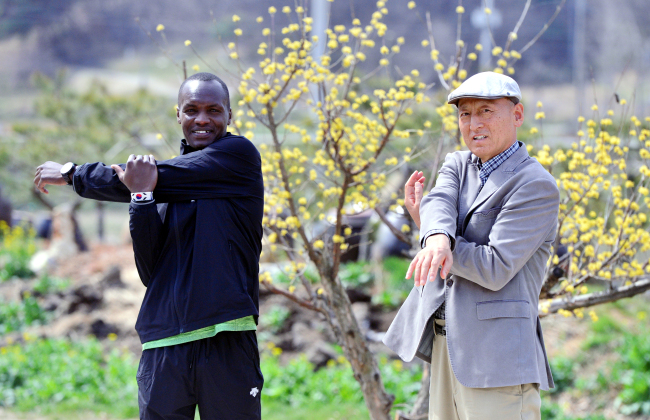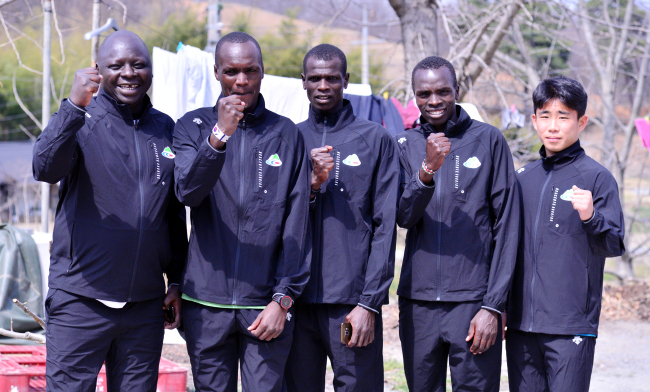[Eye] A day in the life of a Kenyan-born Korean marathoner
Naturalized runner lives in old hanok, eats ramen for lunch while training for Olympics
By Lee Sun-youngPublished : April 19, 2019 - 13:11
CHEONGYANG, South Chungcheong Province -- Deep in the countryside in Cheongyang County, best known for its ultra-spicy chili peppers, an aspiring Olympic marathoner lives in an old hanok residence.
Born in Kenya as Wilson Loyanae Erupe and naturalized in South Korea as Oh Joo-han, he runs several kilometers along a branch of the Geum River every morning, aiming for a medal at the 2020 Tokyo Olympic Games.
“I like (it) here,” said the 31-year-old athlete, standing in his front yard where clothes were hung out to dry.
Born in Kenya as Wilson Loyanae Erupe and naturalized in South Korea as Oh Joo-han, he runs several kilometers along a branch of the Geum River every morning, aiming for a medal at the 2020 Tokyo Olympic Games.
“I like (it) here,” said the 31-year-old athlete, standing in his front yard where clothes were hung out to dry.

It was early afternoon on April 8. He had finished the day’s training, running some 18 kilometers, and had eaten lunch. The day’s lunch was his favorite Korean meal -- ramen and chonggak kimchi.
“Do you like ramen? Isn’t it spicy?” I asked. The questions just came out. After all, instant noodles and spicy radish kimchi are such a mundane combination -- not the kind of food you would expect an aspiring Olympian to eat while training.
“Spicy (food) is good,” Oh said with an innocent smile.
Alongside Oh, soaking up the warmth of the afternoon sun, were his four housemates: running coach Elijah Mutai Chemwolo and athletes Paul Kipkemoi Kipkorir, Issac Kimutai Kiplagat and Min Jin-hong. Except for Min, they all hail from Kenya, the east African country that has produced the world’s fastest distance runners for a number of years now.
The quartet belongs to Cheongyang’s professional athletic club, launched earlier this year after Oh’s naturalization. It was approved after years of controversy, clearing away a major hurdle for his bid at the Olympics.
In this village -- Jeongsan, which is home to some 3,000 inhabitants, mostly aged farmers -- Oh and his housemates are known as the laid-back Africans who run in the morning and rest for the rest of the day.
“The guys run in the morning and then they sit around and drink tea all day. It seems that’s pretty much all they do,” said a villager who owns a chestnut storage facility nearby.
His observation is in sync with that of many sports experts who have sought to uncover the secret behind Kenyan runners’ winning streak: They run hard and rest hard.
“Today was an easy training day,” Coach Chemwolo said, adding that the athletes had run at a comfortable speed. “Tomorrow is the speed training.” The three running mates are pacemakers for Oh, whose personal best is 2 hours, 5 minutes and 13 seconds, recorded at the 2016 Seoul International Marathon.
That’s more than two minutes faster than the Korean record -- 2 hours, 7 minutes and 20 seconds -- set in 2000 by 1996 Olympic silver medalist Lee Bong-ju. No Korean has made it under the 2:10:00 mark since Jeong Jin-hyeok’s 2:09:28 in 2011.

Oh’s first encounter with Korea was a running camp in his native country in 2007 organized by Oh Chang-seok, the former coach of the Korea Armed Forces Athletic Corp.
“He was a gemstone waiting to be discovered,” said the senior Oh, who is also a professor at Baekseok University in nearby Cheonan. “He was a diligent runner, not tainted by the outside world.”
It was through this Korean coach that the then-Erupe discovered his potential as a marathoner. Since then, he has won in seven international races -- all in Korea.
The coach is like a father to him, which is why he chose Oh as his Korean family name. Oh Joo-han means “I run for Korea,” he explained.
His naturalization took more than three years and was a source of division within the local athletic community.
Opponents said the import of a Kenyan-born runner would kill homegrown runners’ chances of winning here.
But Coach Oh didn’t see it that way. Instead, he believed, it could provide a much-needed shot in the arm for the Korean marathon community, which he thought had stagnated for too long.
“Athletes grow through competition. They will learn a lot, running and competing with world-class runners,” he stressed.
He believes Oh Joo-han stands a real chance at the Olympic podium. To be part of Team Korea at the Tokyo Olympics, the runner has to finish an international race within 2 hours, 11 minutes and 30 seconds by the end of this year.
“He’s aiming for an Olympic medal. Making the Korean team cutline shouldn’t be a thing for him,” the professor said, adding they haven’t yet decided which race he will run.
Oh’s Kenyan coach, Chemwolo, said the main training will be in Kenya. Training in high-altitude environments makes athletes stronger.
“Besides, the roads are not busy like here,” he added.
Oh Joo-han has a family in his native Turkana County -- a wife, a 5-year-old son named Ryan and a 3-month-old daughter named Blessing.
While training in Korea, the young marathoner plans to enjoy life in his adopted country, he says. The latest object of his affection is those yellow packets of instant coffee.
So how does he stay in touch with his family and newborn baby in Kenya? His answer surprised me once again. “KakaoTalk. My wife has KakaoTalk,” he said.
Then he boasted that the old hanok is equipped with super-fast Wi-Fi.
By Lee Sun-young (milaya@heraldcorp.com)








![[KH Explains] How should Korea adjust its trade defenses against Chinese EVs?](http://res.heraldm.com/phpwas/restmb_idxmake.php?idx=644&simg=/content/image/2024/04/15/20240415050562_0.jpg&u=20240415144419)











![[Today’s K-pop] Stray Kids to return soon: report](http://res.heraldm.com/phpwas/restmb_idxmake.php?idx=642&simg=/content/image/2024/04/16/20240416050713_0.jpg&u=)